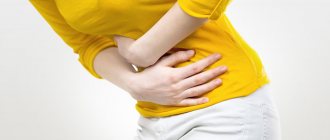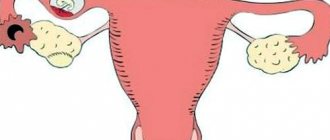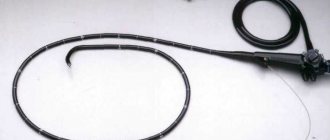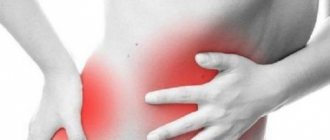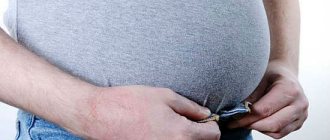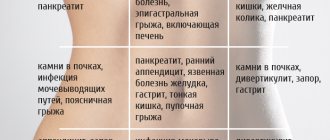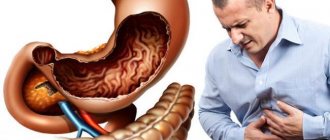Heaviness in the lower abdomen may occur due to temporary changes and disruptions in the functioning of the body or may be a symptom of diseases of the internal organs.
The lower abdomen contains the organs of the gastrointestinal tract, urinary and reproductive systems. Painful or uncomfortable sensations in the lower abdomen may be a symptom of diseases of the abdominal organs, pelvis or musculoskeletal disorders. Also, a feeling of heaviness in the lower abdomen may be a sign of temporary changes or disruptions in the body, for example, after overeating, consuming fatty and fried foods, or alcoholic beverages. Women often experience discomfort in the lower abdomen during menstruation and menopause.
Abdominal pain caused by normal physiological processes in the body is felt for a short time (no more than 2-3 days). Even with mild chronic abdominal pain, you should consult a doctor for advice, since any pain indicates a malfunction in the body.
Heaviness in the lower abdomen from a gynecological point of view
Regular and short-term pulling sensations in the lower abdomen in women can be physiological manifestations of the norm: during menstruation, ovulation, pregnancy, menopause. Dysmenorrhea (pulling moderate pain in the lower abdomen) is the main symptom of premenstrual syndrome. Cramps in the lower abdomen are caused by contractions of the uterus and may appear on the eve of menstruation and last for several days.
Even mild nagging pain in the lower abdomen that lasts a long time (more than 1–2 weeks) requires diagnosis to prevent the development of gynecological pathologies. If you have stabbing pain in the abdomen and accompanying symptoms (uncharacteristic discharge, chills, elevated body temperature), you should consult a gynecologist as soon as possible. Nagging abdominal pain in women may indicate the development of the following gynecological diseases:
- inflammation of the uterus and its appendages (fallopian tubes and ovaries);
- ovarian cyst (benign formation of the ovaries);
- uterine fibroids (neoplastic growths in the uterine cavity);
- endometriosis (pathological growth of the uterine mucosa).
Heaviness in the abdomen and lower back in the middle of the menstrual cycle may indicate an ectopic pregnancy. Also a reason to make an appointment with a gynecologist for a consultation is regular aching pain or heaviness in the lower abdomen after sex, since it can signal the presence of pathologies of the pelvic organs, inflammatory diseases of the genital organs (vulvitis, vulvovaginitis, endometritis) or sexually transmitted infections (STIs).
Nausea, weakness and dizziness
Conditions that can lead to nausea and malaise:
- Anemia. When the level of hemoglobin in the blood drops, a person experiences weakness, quickly gets tired, and his skin becomes pale. Seizures appear in the corners of the mouth. The problem can only be dealt with if the cause of the drop in hemoglobin levels in the blood is eliminated. The patient must be prescribed iron supplements.
- Drop in blood sugar levels. People with diabetes mellitus most often suffer from this problem. This situation often occurs after administering insulin and skipping another meal. To cope with the problem, you can drink sweet tea, eat candy or a spoonful of honey.
- Fall in blood pressure. In addition to nausea, a person will be bothered by dizziness, as well as increased weakness. To increase your blood pressure, you need to drink strong, sweet tea or a glass of coffee. If your blood pressure continues to drop, you should seek medical help.
- Exhaustion of the body. If a person adheres to a strict diet or limits himself to food, then he develops weakness, begins to feel sick, and his performance deteriorates. Elimination of errors in nutrition allows you to cope with the problem.
Conditions that can lead to headaches and nausea:
- Migraine. In this case, the person will have a headache on one side. Nausea is not accompanied by vomiting, increased body temperature, or impaired coordination of movements and speech. In order to reduce the symptoms of migraine, you need to take Nomigren. Only a doctor can prescribe medications to treat the disease after ruling out stroke as the cause of the headache.
- Meningitis. With this disease, a person’s body temperature rises, his head hurts, and his eyes water. If you suspect meningitis, seek immediate medical attention. The patient is urgently hospitalized as his life is in danger.
- Hypertension. When blood pressure rises, the head hurts in the back of the head, and flies begin to fly in front of the eyes. In this case, it is necessary to take an antihypertensive drug, for example, Kaptopress, as well as No-shpu or Spazmalgon. If the pressure exceeds the mark on the tonometer 160/100, then you need to call a medical team, as this threatens a stroke.
- Stroke. In addition to nausea, a person suffers from severe headaches, his speech is impaired, the sensitivity of the limbs worsens, and coordination of movements suffers. The person must be hospitalized immediately. The sooner the victim receives medical assistance, the higher the chances of survival.
- Transient ischemic attack. It is a disorder of cerebral circulation. Such a spasm can pass without consequences for health, or it can lead to a stroke.
- Encephalitis. With this disease, a person becomes very sick and may vomit. Body temperature rises to high levels, speech suffers, and coordination of movements is impaired.
- A brain tumor. Body temperature most often remains within normal limits, but speech, swallowing, and coordination of movements suffer. The patient requires qualified medical care. Self-medication is unacceptable.
You cannot cope with diseases such as Meniere's disease, labyrinth, osteosclerosis and vestibular neuritis on your own. All of them are accompanied by nausea and dizziness.
Heaviness in the lower abdomen during pregnancy
Heaviness in the lower abdomen in women during pregnancy appears due to an enlarged uterus, which puts pressure on neighboring organs (intestines, bladder, kidneys) and displaces them. Moderate pulling sensations during pregnancy without accompanying symptoms (stabbing and cramping pain, bleeding, elevated body temperature) are the norm and only require compliance with the general recommendations of the gynecologist: adhere to a healthy and balanced diet with sufficient vitamins and minerals, exclude foods that cause increased gas formation, Get moderate physical activity, for example, walking in the fresh air.
As a rule, a feeling of heaviness in the lower abdomen occurs in the early stages of pregnancy due to hormonal changes and stretching of the walls of the uterus. In late pregnancy (third trimester), abdominal and lower back pain can be caused by fetal movements and changes in the pelvic bones.
The general condition and well-being of a woman during pregnancy is monitored by an obstetrician-gynecologist. If abdominal pain intensifies or spotting appears, you should consult a gynecologist to prevent miscarriage.
Our advantages
- Fast and high-quality diagnostics. In our hospital, the patient is examined using the latest equipment, which increases the efficiency of diagnosing the cause of pain in the lower abdomen.
- Doctors. The doctors of the gynecology department of the Yauza Clinical Hospital have extensive experience, scientific titles and degrees, the highest qualification category, and are proficient in all modern diagnostic methods, which allows them to quickly determine the cause of pain and provide effective and high-quality treatment.
- Complexity. Diagnosis and treatment of abdominal pain, including during pregnancy, is carried out jointly with other specialists.
- Equipped operating room. The presence of advanced equipment in the operating room allows, if necessary, to carry out surgical interventions as efficiently as possible (including minimally invasive - laparoscopic, hysteroscopy, transvaginal access, etc.).
You can see prices for services
Heaviness in the lower abdomen in men
Heaviness in the lower abdomen in men can be caused by several reasons: urological diseases, pathologies of the gastrointestinal tract or disorders of the musculoskeletal system. Causes of abdominal heaviness in men:
- inflammatory diseases of the genitourinary system: prostatitis, urethritis, cystitis;
- prostate adenoma (pathological growth of prostate tissue);
- testicular cyst;
- sexually transmitted infections (STDs);
- urolithiasis disease;
- inguinal hernia.
The appearance of pain indicates a pathological process in the body, so you should consult a therapist for advice. The therapist will prescribe studies (ultrasound of the pelvic and abdominal organs) and laboratory tests (urine, blood) to determine the causes of pain and identify pathologies.
Feeling of heaviness in the lower abdomen and gastrointestinal problems
A feeling of heaviness in the lower abdomen may indicate problems with the gastrointestinal tract, for example, pathologies of the stomach, intestines, pancreas or gall bladder. To determine gastrointestinal disease, you need to see a doctor for diagnosis, which includes gastroscopy, ultrasound of the abdominal organs, blood tests and feces.
Heaviness in the lower abdomen after eating and a feeling of fullness occurs against the background of intestinal diseases (ulcerative colitis, enteritis, dysbacteriosis). As a rule, intestinal pathologies are accompanied by bloating (flatulence) and stool upset. Flatulence occurs due to the accumulation of gas in the gastrointestinal tract and causes discomfort to a person. Treatment of flatulence is prescribed by a gastroenterologist based on the results of the examination.
Cramps in the lower abdomen may be accompanied by diseases of the stomach and pancreas. A feeling of heaviness and discomfort in the stomach appears in the early stages of the development of gastritis (inflammation of the gastric mucosa) or pancreatitis (inflammation of the pancreas).
How to cope with nausea during motion sickness?
If a person gets motion sickness while traveling on public transport, then the following recommendations can come to his aid:
- You need to eat before the upcoming trip, but about 2 hours should pass before it starts.
- You should not sit with your back facing the direction of travel. You must sit as well as the driver.
- Avoid looking out of side windows.
- There is no need to lean in the direction the car is turning.
- You cannot read while driving.
- The windows need to be opened periodically to allow fresh air into the car. When sailing on a ship, you need to walk around the deck.
- Mint candies and breathing exercises can help you cope with attacks of nausea.
- If there are no contraindications, then you need to take a Dramamine or Avia-Sea tablet.
When a person has already begun to feel sick due to motion sickness, you need to ask the driver to stop the vehicle and get out to get some fresh air. At this time, you can chew a small piece of ginger, which should be kept with you. You can shake your head from side to side.
If you cannot cope with motion sickness using conventional means, you can visit a neurologist. The doctor will recommend what exercises are best to do to combat motion sickness and what pills you can take while traveling to feel better.
It is not recommended to buy anti-sickness medications on your own. Each such remedy has contraindications and side effects. Therefore, it is better to consult a doctor before taking it.
The connection between heaviness in the lower abdomen and diseases of the urinary system
Heaviness in the lower abdomen in men and women may indicate problems with the urinary system in the early stages. Pathologies of the urinary tract and kidneys, accompanied by nagging pain in the lower abdomen:
- pyelonephritis (kidney inflammation);
- urolithiasis (formation of stones in the kidneys and bladder);
- urinary tract infections (cystitis, urethritis).
If there is heaviness in the lower abdomen and if urination is impaired (difficulty, painful, frequent bowel movements), you must make an appointment with a urologist.
Other causes of heaviness in the lower abdomen
Heaviness in the lower abdomen can be caused not only by pathologies of internal organs, but also by disorders in the musculoskeletal system. Causes of nagging pain in the abdomen:
- pathologies of the lumbosacral spine (osteochondrosis, osteoarthritis);
- varicose veins in the pelvic area;
- intervertebral hernias, protrusions.
A nagging pain in the abdomen may appear after lifting weights or excessive physical exertion on the abs, which results in stretching of the abdominal cavity or rupture of muscle fibers.
How to cope with nausea after drinking alcohol?
If nausea develops after drinking alcohol, you can use the following recommendations:
- Take a sorbent drug, for example, Activated carbon, Enterosgel, Polysorb, Atoxil, etc.
- You need to drink water.
- You should definitely replenish your body's reserves of vitamin C. For this purpose, you can take 500 mg of Ascorbic acid, as well as drink rosehip decoction, tea with lemon. Eating grapefruit or orange is a good way to cope with nausea.
- An hour after taking a portion of vitamin C, you need to drink a sorbent drug.
- It is necessary to rest as much as possible and drink water. It is imperative to ensure that it is excreted in sufficient quantities in the urine. Excessive accumulation of fluid in the body increases the load on the heart, which in this condition can be dangerous.
- You should not drink a lot of mineral water with gas. Gases will cause the stomach to become full, which will increase the feeling of nausea.
- It is necessary to take the sorbent drug 4 times a day.
A bath or shower allows you to relax and improve your well-being. Water has a beneficial effect on the body as a whole.
